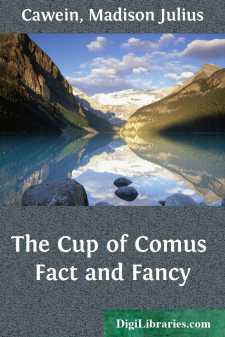Fiction
- Action & Adventure 180
- Biographical 15
- Christian 59
- Classics 6965
- Coming of Age 5
- Contemporary Women 3
- Erotica 8
- Espionage/Intrigue 12
- Fairy Tales, Folklore & Mythology 236
- Family Life 169
- Fantasy 117
- Gay 1
- General 596
- Ghost 32
- Historical 808
- Horror 43
- Humorous 160
- Jewish 25
- Legal 4
- Medical 22
- Mystery & Detective 315
- Political 49
- Psychological 41
- Religious 64
- Romance 159
- Sagas 11
- Science Fiction 730
- Sea Stories 113
- Short Stories (single author) 537
- Sports 10
- Suspense 1
- Technological 8
- Thrillers 2
- Urban Life 31
- Visionary & Metaphysical 1
- War & Military 173
- Westerns 199
Fiction Books
Sort by:
CHAPTER I. THE SETTING FORTH. A voyage across the Atlantic Ocean in the year 1799 was not the every-day affair that it has come to be at the present time. There were no "ocean greyhounds" then. The passage was a long and trying one in the clumsy craft of those days, and people looked upon it as a more serious affair than they now do on a tour round the world. In the year 1799 few people thought...
more...
CHAPTER I. INTRODUCTORY. Our neighbours on the other side of the English Channel have been accused of calling us a “nation of shopkeepers.” No doubt the definition is not bad; and, so long as the goods supplied bear the hall-mark of British integrity, there is nothing to be ashamed of in the appellation; still, with all due deference, I think we might more appropriately be called a nation of...
more...
Friend, for the sake of loves we hold in common,The love of books, of paintings, rhyme and fiction;And for the sake of that divine affliction,The love of art, passing the love of woman;—By which all life's made nobler, superhuman,Lifting the soul above, and, without frictionOf Time, that puts failure in his prediction,—Works to some end through hearts that dreams illumine:To you I pour this Cup...
more...
PART FIRST. THE BONFIRE OF ST. JOHN. Early in the century, on a summer evening, Jean Lozier stood on the bluff looking at Kaskaskia. He loved it with the homesick longing of one who is born for towns and condemned to the fields. Moses looking into the promised land had such visions and ideals as this old lad cherished. Jean was old in feeling, though not yet out of his teens. The training-masters of...
more...
CHAPTER I THE EARLY LITERATURE One Sunday morning, about the year 1661, a group of Indians was gathered around a noble-looking man, listening to a story he was reading. It was summer and the day was beautiful, and the little Indian children who sat listening were so interested that not even the thought of their favorite haunts by brookside or meadow could tempt them from the spot. The story was about...
more...
Chapter One. The Story of the Buried Treasure. Those of my readers who happen to be well acquainted with Weymouth, will also be assuredly acquainted with a certain lane, known as Buxton’s Lane, branching off to the right from the high-road at Rodwell, and connecting that suburb with the picturesque little village of Wyke. I make this assertion with the most perfect confidence, because Buxton’s Lane...
more...
by:
Edgar Saltus
"I wish you a happy New Year, sir." It was the servant, green of livery, the yellow waistcoat slashed with black, bearing the coffee and fruit. "Put it there, please," Roland answered. And then, in recognition of the salutation, he added, "Thanks: the same to you." "H'm," he mused, as the man withdrew, "I ought to have tipped him, I suppose." He leaned from...
more...
No description available
THE HOUSE ON THE BRAE On the bump of green round which the brae twists, at the top of the brae, and within cry of T'nowhead Farm, still stands a one-storey house, whose whitewashed walls, streaked with the discoloration that rain leaves, look yellow when the snow comes. In the old days the stiff ascent left Thrums behind, and where is now the making of a suburb was only a poor row of dwellings and...
more...
IN SEARCH OF THE UNKNOWN I Because it all seems so improbable—so horribly impossible to me now, sitting here safe and sane in my own library—I hesitate to record an episode which already appears to me less horrible than grotesque. Yet, unless this story is written now, I know I shall never have the courage to tell the truth about the matter—not from fear of ridicule, but because I myself shall...
more...











